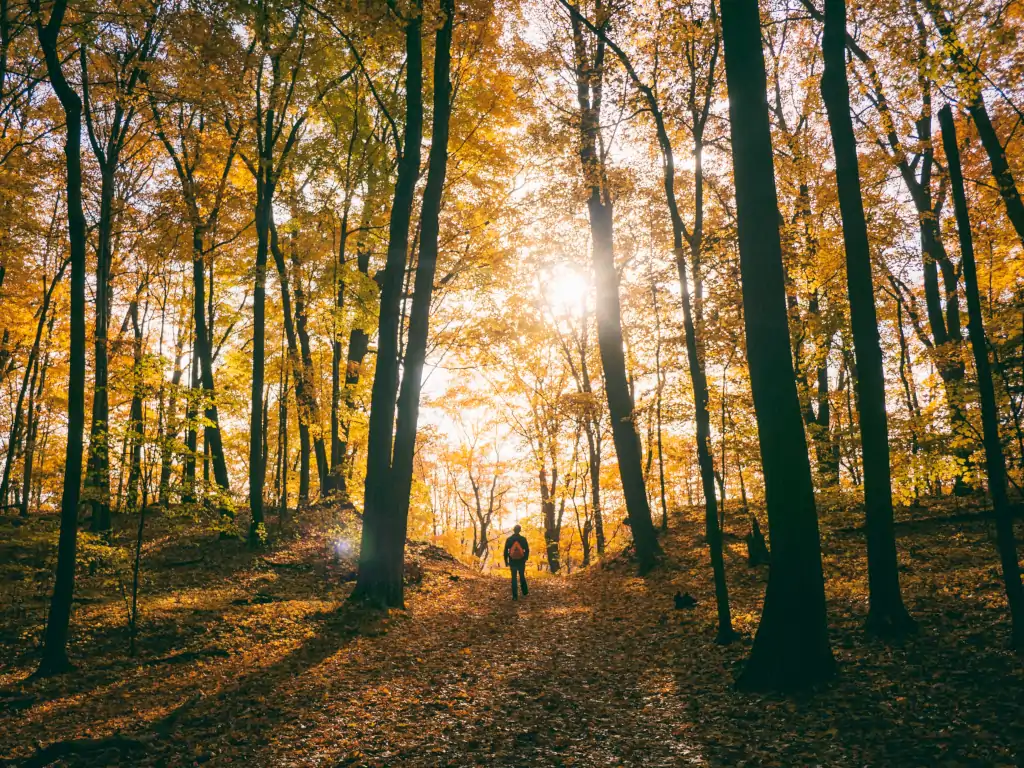Exploring Shinrin-Yoku: The Science Behind the Forest Bathing Trend
In today's fast-paced world, finding moments of tranquillity and inner peace have become more important than ever. One practice that has gained significant attention in recent years is shinrin-yoku, also known as "forest bathing." Rooted in ancient Japanese traditions, shinrin-yoku is now a contemporary trend that is espoused to offer numerous physical, mental, and emotional benefits. But is there any science behind it or is it another Insta-travel-trend ripe for the selfie enthusiast?
In this blog post, I will delve into the science behind shinrin-yoku and explore its impact on our wellbeing.
By Laura Jones | 13th Jun 2023

The Essence of Shinrin-Yoku
Shinrin-yoku translates to "forest bathing," but it's much more than just taking a walk in the woods. It is a mindful immersion in nature that engages all senses. By consciously connecting with the natural environment, shinrin-yoku is purported to provide a unique opportunity to relieve stress, improve mood, and enhance overall health.
The Psychological and Physiological Benefits of Forest Bathing
Researchers have demonstrated that there is actually a measurable impact of shinrin-yoku practice on our mental and physical wellbeing. Studies have shown that spending time in nature can reduce anxiety, alleviate symptoms of depression, and improve cognitive function ref("[1]"). These effects may in fact be more pronounced in individuals that are experiencing mental health conditions. In one study it was shown that stress-reduction as a result of spending time in a forest was much more pronounced (relative to the rest of the study participants) in those individuals that were experiencing chronic stress ref("[2]").
Mechanisms behind these effects, such as the role of phytoncides, have been shown to enhance mood and reduce stress levels ref("[3]") ref("[4]"). Phytoncides are aromatic compounds released by trees and other plants that can induce olfaction-related responses in humans. In one study the smell of Japanese cedar chips was shown to induce a relaxed state and lower blood pressure ref("[5]"). While the experience of odour is subjective, interestingly, participants that reported the smell as unpleasant also showed a decrease in blood pressure.

Certain phytoncides have been shown to affect the human immune system, specifically an increase in human natural killer cell (NK) activity. NK cells play an important role in fighting infection and are believed to play a role in preventing certain tumour formation. The positive effect on NK activity may actually last long after a forest bathing experience. Researchers in Japan demonstrated that 7 days after a forest bathing trip, NK activity was significantly elevated above baseline levels in participants ref("[6]"). While it is not clear if phytoncides were the direct cause of this (though the study did control for other well known positive immune system influences like exercise, sleep and alcohol reduction), it was shown that a forest bathing experience did increase NK activity and also levels of certain anticancer proteins.
The same researchers have also demonstrated that the phytoncides α-Pinene and β-Pinene affect the human immune system when subjects were exposed in an artificial environment - a hotel room ref("[7]"). An introduction of these compounds was related to an increase in human natural killer cell (NK) activity and a reduction of adrenaline in urine samples.
Forest bathing has similar measurable effects on wellbeing as other mindfulness practices such as Compassionate Mind Training ref("[8]"). So some may argue that it is the mindfulness and deliberate relaxation that contributes to the overall health benefit. The benefits of shinrin-yoku may be specifically derived from a unique blend of forest volatiles, or arise because the experience affords the individual an opportunity to become deeply mindful, or it may be a combination of both. What is clear is that the benefits of shinrin-yoku are likely to go far beyond the individual.
Socio-Environmental benefits of Forest Bathing
It's well understood that forests and other natural ecosystems play a vital role in climate regulation, biodiversity preservation, and the maintenance of natural resources. Over the last several decades there has been an observable decline in the natural experience and subsequently a loss of benefits both for human beings and the natural world which researchers have depressingly coined “disaffection toward nature” ref("[9]").

It may be that conscious immersion in the forest environment can foster a deeper appreciation for nature, leading to increased environmental awareness generally. This awareness, inturn, may improve ecological outcomes such as conservation efforts and consumer choices. At a societal level, increases in the positive interaction with and awareness of nature may influence policy decisions that have positive ecological outcomes ref("[10]").
Let Shinrin-Yoku Inspire Your Routine
For students, researchers and busy professionals already immersed in study and work, finding time for self-care can be challenging. If you can carve out the time to go on an organised and immersive forest therapy program, great! But this isn't always practical.
Here are some ideas on how to incorporate shinrin-yoku essence into a busy schedule:
◦ Visit nearby parks during your lunch break. Do it on your own.
◦ Get some cheap binoculars and go on a bird walk once a month.
◦ Hike on the weekend.
◦ Or even create a green oasis in your living space (perhaps with an oil diffuser and some cedar oil?).
It's important to note that these practices are likely to only be effective if you are truly present in the experience. Do not become distracted by using your phone to take photos, or posting on social media.
Shinrin-yoku has evolved from a traditional Japanese practice into a contemporary trend embraced by individuals seeking balance and well-being in their lives. I have personally found that understanding the scientific basis of shinrin-yoku has enlivened my enthusiasm for something that I have long-since suspected, that natural experiences really are good for us in many ways.
So, take a moment to step into the forest and let nature nurture your body, mind, and soul.
References
[1] Hansen MM, Jones R, Tocchini K. Shinrin-Yoku (Forest Bathing) and Nature Therapy: A State-of-the-Art Review. International Journal of Environmental Research and Public Health. 2017; 14(8):851.
[2] Morita E, Fukuda S, Nagano J, Hamajima N, Yamamoto H, Iwai Y, et al. Psychological effects of forest environments on healthy adults: Shinrin-yoku (forest-air bathing, walking) as a possible method of stress reduction. Public Health. 2007;121(1):54–63.
[3] Chae Y, Lee S, Jo Y, Kang S, Park S, Kang H. The Effects of Forest Therapy on Immune Function. International Journal of Environmental Research and Public Health. 2021; 18(16):8440.
[4] Kuo, M. (2015). How might contact with nature promote human health? Promising mechanisms and a possible central pathway. Frontiers in psychology, 1093.
[5] Miyazaki, Y. (1999). Effect of wooden odoriferous substance on humans. J Physiol Anthropol Appl Human Sci, 18, 189.
[6] Li, Q. Effect of forest bathing trips on human immune function. Environ Health Prev Med 15, 9–17 (2010).
[7] Li, Q., Kobayashi, M., Wakayama, Y., Inagaki, H., Katsumata, M., Hirata, Y., ... & Miyazaki, Y. (2009). Effect of phytoncide from trees on human natural killer cell function. International journal of immunopathology and pharmacology, 22(4), 951-959.
[8] McEwan K, Giles D, Clarke FJ, Kotera Y, Evans G, Terebenina O, Minou L, Teeling C, Basran J, Wood W, Weil D. A Pragmatic Controlled Trial of Forest Bathing Compared with Compassionate Mind Training in the UK: Impacts on Self-Reported Wellbeing and Heart Rate Variability. Sustainability. 2021; 13(3):1380. https://doi.org/10.3390/su13031380
[9] Soga, M., & Gaston, K. J. (2016). Extinction of experience: the loss of human–nature interactions. Frontiers in Ecology and the Environment, 14(2), 94-101.
[10] Gaston, K. J., Soga, M., Duffy, J. P., Garrett, J. K., Gaston, S., & Cox, D. T. (2018). Personalised ecology. Trends in Ecology & Evolution, 33(12), 916-925.